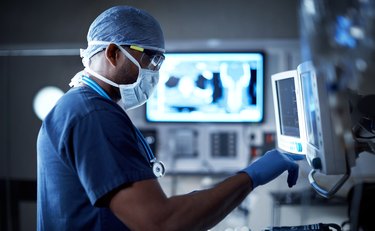
In just a few short decades, the medical field has become increasingly reliant on computers to bring the most advanced forms of diagnosis and treatment to patients. The influence of computer technology can be seen in imaging systems, clinical labs, medical record storage and hospital operations as well as in the business offices of health care providers. The application of the computer in health care has helped doctors and researchers advance medical science while expanding the level of care for patients.
Medical Imaging
Video of the Day
Medical imaging is a broad term that covers technology used to create images of the human body for study and diagnosis. It includes magnetic resonance imaging (MRI), ultrasound, CT scans and X-Rays. All of these devices are controlled by computers. Even X-Ray imaging, which has been used in medicine since the early 20th century, now uses computers for image adjustment and transfer.
Video of the Day
Patient Monitoring
Modern computer-based patient monitoring machines allow heart rate, respiratory activity, blood pressure and other critical vital signs to be collected automatically in digital form. Computer monitoring machines cut down on the time spent on routine tests in doctors' offices. In hospitals, they have the ability to automatically update a patient's chart and notify hospital staff of changes to a patient's vitals.
Computer-Assisted Surgery
Computers are used to assist in planning, teaching and performing many surgical procedures. One of the biggest recent developments in this area is robotically-assisted surgery (RAS), which allows surgeons to use robotic devices and computer software to complete minimally-invasive procedures. The surgeon remains in control and guides the robot device to complete complex operations in confined parts of the body.
Networks and Digital Communication
Computer networks and the internet have increased the means of communication between medical professionals with email, instant messaging, video chats and webinars. Being able to connect digitally helps health care professionals stay current with the latest medical developments. They can also consult with colleagues in real-time and receive second opinions for diagnoses and treatment options.
Telemedicine
The concept of a house visit is returning to health care in the form of telemedicine. Thanks to computers and smartphones, some medical professionals use video chats to visit with patients remotely. Besides benefitting patients who live in rural areas with limited health care options, telemedicine has proved useful following natural disasters and in war zones.
Electronic Health Records
Perhaps one of the newest major developments in health care, the electronic health record (EHR) is also one of the most far-reaching. An EHR is a digital version of a patient's paper chart that is instantly available to authorized health providers. The U.S. federal government encourages health care providers to use EHRs through its Medicare and Medicaid HER Incentive Program.
Medical Databases
Computers have brought the development of many useful software solutions in the medical field. Large public health organizations like the World Health Organization and the Centers for Disease Control have amassed huge databases of information related to diseases and health statistics. There are also public databases available with information about toxic substances, clinical research results and drug coverage.
Medical Research
Much of the current research being done into incurable diseases like AIDS and cancer involves the creation of complex computer simulations. Supercomputers and distributed computer systems are able to handle massive amounts of research data and analyze millions of possible outcomes. The mapping of the human genome is one example of how computers are advancing medical research.
Computers and Hospital Administration
Most hospitals depend heavily on computers and specialized software that handles patient records, supply inventory, personnel scheduling and all the other details required to care for patients. The use of a computer in a hospital extends to every department, from the surgical center to the cafeteria. Larger hospitals may have their own private computer servers and network and a team of IT specialists who maintain them.
Uses of Computer in Offices
The typical doctor's office relies heavily on computer technology for day-to-day operations. Everything from patient scheduling to billing to filing insurance claims takes place through a computer. Many doctors no longer write prescriptions, but instead send a digital prescription from their office computer directly to the patient's pharmacy. During diagnosis, many doctors consult online databases of medical conditions using a computer instead of looking at a medical book.